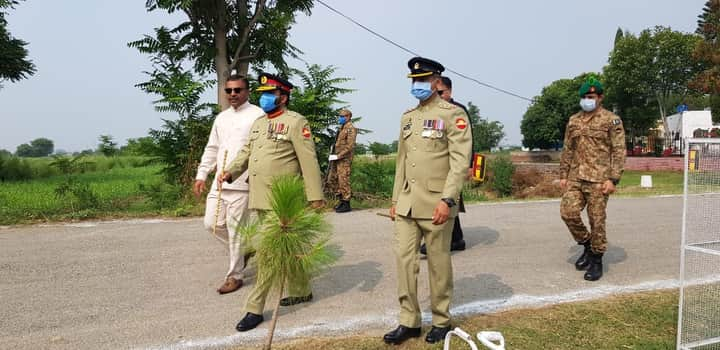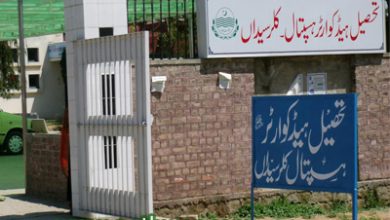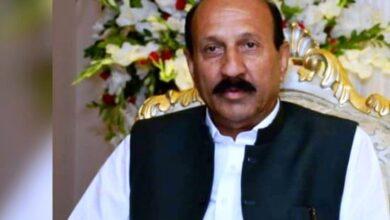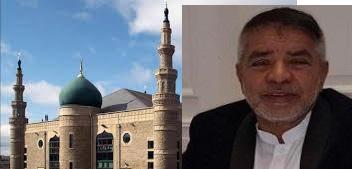
پاکستان کا پہلا نشان حیدر حاصل کرنے والے پاک فوج کے نڈر افسر،گوجر خان کی شان، کیپٹن سرور شہید نشان حیدر کا 72 واں یوم شہادت انتہائی عقیدت و احترام کے ساتھ منایا گیا
اسلام پورہ جبر(نمائندہ پوٹھوار ڈاٹ کوم۔محمد انجم ملک) پاکستان کا پہلا نشان حیدر حاصل کرنے والے پاک فوج کے نڈر افسر،گوجر خان کی شان، کیپٹن سرور شہید نشان حیدر کا 72 واں یوم شہادت انتہائی عقیدت و احترام کے ساتھ منایا گیا، کیپٹن سرور شہید نشان حیدر کے آبائی گائوں سنگھوری میں شہید کی یادگار پر ایک پر وقار تقریب کا اہتمام کیا گیا اس موقع پر سیکیورٹی کے انتہائی سخت انتظامات کیے گئے تھیتقریب میں پنجاب رجمنٹ کے ایک دستے نے سرور شہید کی یاد گار پر سلامی پیش کی 10 کور راولپنڈی کے بریگیڈئر نوید احمد نے چیف آف آرمی سٹاف کی جانب سے یادگار پر پھولوں کی چادر چڑھائی تقریب میں کیپٹن سرور شہید کے پوتے میجر عدیل سرور اور اسسٹنٹ کمشنر گوجرخان حرا رضوان نے بھی شرکت کی تقریب کے بعد بریگڈیئر نوید اور اسسٹنٹ کمشنر نے یاد گار کے احاطے میں پودے لگا کر شجر کاری مہم کا آغاز بھی کیا.حرا رضوان نے کہا کہ اپنے ہیروز کو یاد رکھنا زندہ قوموں کی نشانی ہے،سرور شہید ہمارے ایسے قومی ہیرو ہیں جنہوں نے سب سے پہلے نشان حیدر حاڈل کرنے کا اعزاز حاصل کیا،
Gujar Khan; The 72nd Martyrdom Day of Captain Sarwar Shaheed Nishan Haider, the fearless officer of Pakistan Army who received the first Nishan Haider of Pakistan, was celebrated with utmost devotion and respect in his native village Singhori.
Gujar Khan; On July 27, the nation commemorated the 72nd death anniversary of Captain Muhammad Sarwar Shaheed, the first person to be awarded Pakistan’s highest military award for bravery – Nishan-e-Haider – for laying down his life during the first Pakistan-India war in 1948.
Sarwar was born on November 10, 1910 at Singhori village in Gujar Khan Tehsil. His father, Raja Muhammad Hayat Khan, was also a havaldar in the British Army. Following in the footsteps of his father, he joined military in 1929 as a sepoy at the age of 19 years.
In 1939, Sarwar was invited to attend the Indian Military Academy in Dehradun from where he passed out on April 21, 1944 as a commissioned officer and became a second lieutenant. He got promoted as a temporary captain on June 30, 1944.
In 1945, the temporary captain took part in battle in Burma against Japanese. He joined in the Punjab Regiment in March 1946 and served it till August. He was promoted as a captain on February 1, 1947.
When a war broke out between the newly formed states of Pakistan and India after illegal annexation of the Himalayan valley of Jammu and Kashmir with India, Sarwar immediately volunteered but he was not allowed by his officers who wanted him to complete his training in military signals.
In 1948, he took over the command of the 2nd Battalion of the Punjab Regiment of the Pakistan Army as its commanding officer, organized with the purpose of retaking Kashmir.
A march towards the Uri region of Kashmir was commenced under Captain Sarwar, and the battalion led an attack on the disorganized Indian Army’s troops, forcing them to retreat from the Gilgit-Baltistan to Ladakh in Kashmir on July 26, 1948.
Captain Sarwar’s company followed the retreating Indian Army’s troops to the Uri region where his unit faced off the strongly fortified enemy position.
His company was only 50 yards away from the fortified enemy position as the Indian Army’s soldiers began their mortar shelling at his positions. He had received instructions to lead the attack on the left side of the Indian bunker which was surrounded with barbed wires.
Sarwar decided to cut the wires and took along only six men to perform this arduous task.
Despite massive Indian firing, Captain Sarwar succeeded to cut the barbed wires with a bolt cutter. Due to continuous downpour of shelling, his chest had perforated .He died while clearing the passage for his soldiers The brave captain was 38 years old when he embraced martyrdom.
Chief military spokesperson Maj General Babar Iftikhar paid tribute to the Captain Sarwar saying “every bullet he took for the country strengthens our resolve to defend Pakistan”.






